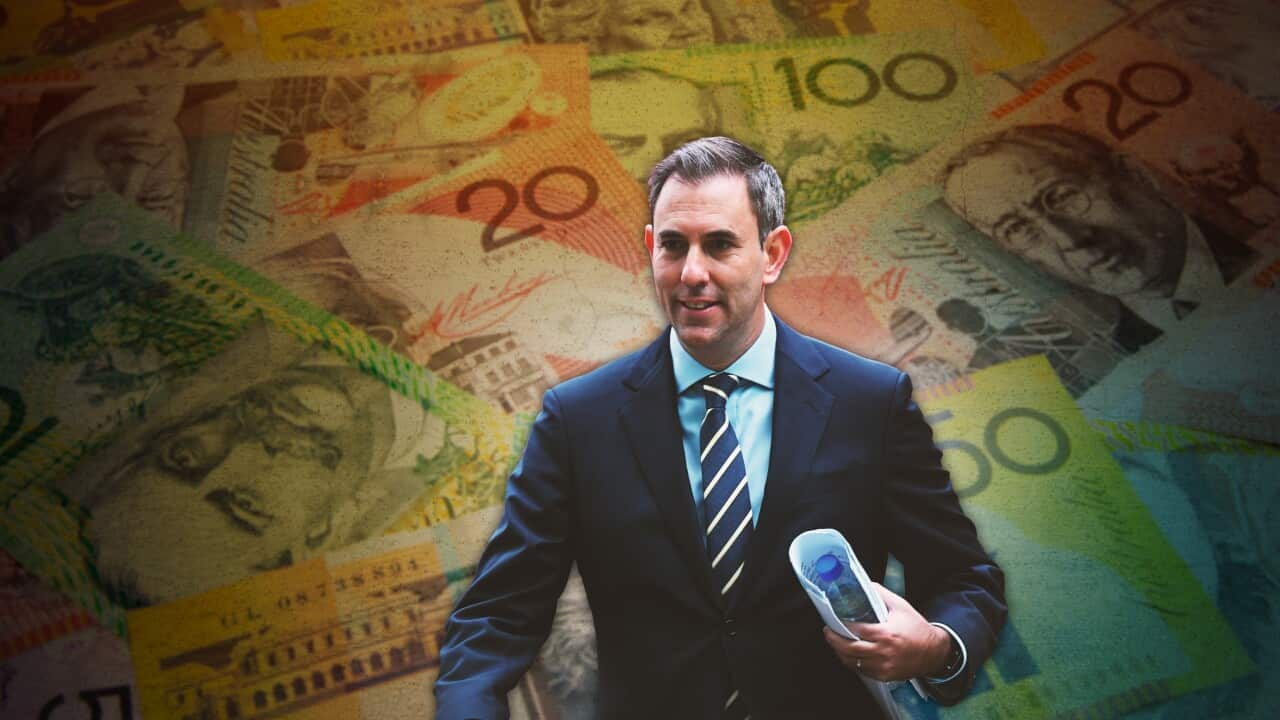Tuesday's federal budget will include increases to the base rate payments of JobSeeker, Austudy and Youth Allowance as well as additional assistance for renters, SBS News understands.
The measures are expected to be included as part of the government's , projected to total $14.6 billion over four years.
The policies included in the package are predicted to directly reduce the Consumer Price Index (CPI) forecast for 2023-24 and not add to broader inflationary pressures in the economy.
Surplus expected for first time in 15 years
The budget is predicted to dip into the black this financial year, which if it eventuates, will be the first time a surplus is recorded in 15 years.
Treasurer Jim Chalmers will unveil updated forecasts on Tuesday, with a near $4 billion surplus predicted for 2022/23.
Mr Chalmers' second budget will unveil smaller deficits than forecast, with a $143 billion reduction over the forward estimates.
But most of the increased revenue will be banked instead of answering calls for boosts to welfare payments with the interest bill on the debt set to hit $110 billion over the next five years.
Just over 80 per cent of the extra revenue will go towards paying down the national debt, bringing the total surplus revenue banked over two budgets to 87 per cent.
"What's absolutely clear is that this outcome would never have been possible without our decision to return most of the upward revisions to revenue to the bottom line," Mr Chalmers said on Monday.
"Our responsible economic management is all about spending restraint, substantial savings redirected to other priorities, and modest but meaningful tax changes."
Gross debt is expected to peak five years earlier and be significantly lower than expected in the October budget. It is projected to be almost $300 billion lower by the end of the medium term (2033-34), saving $83 billion in interest costs over that period.
Addressing caucus members in Canberra on Monday ahead of Tuesday's budget, Prime Minister Anthony Albanese said it would be about aspiration.
"We don't leave people behind but we also don't hold people back," he said.
"This budget will be in the best tradition of the Australian Labor Party, dealing with those immediate challenges, but always with the eye on the future."
While also rolling out power bill relief, cheaper medicines and tax incentives for electrification and energy efficiency upgrades, the government has found $17.8 billion in savings and will reap $2.4 billion extra revenue from taxes on offshore LNG producers.
Opposition finance spokeswoman Jane Hume said the only way to provide genuine relief for struggling families was for the government to rein in its spending and tackle inflation, which was sitting at seven per cent.
"Getting inflation down is the only policy that would provide the cost-of-living relief to all Australians," she said.
Senator Hume said the government had palmed off its responsibility to help bring down inflation to the Reserve Bank.
Greens leader Adam Bandt said the changes to the petroleum resource rent tax had been designed by the "gas cabal" and did not go far enough in taxing producers more to pay for social services.
"If the government had the courage to make the big corporations and the billionaires pay their fair share of tax, then all single parents could be getting the support that they need," he said.
A combination of higher revenues and lower payments is expected to allow the government to deliver the first budget surplus in 15 years, but the bottom line is set to deteriorate from there.
The largest calls on the budget include health, aged care, defence, disability services and interest on debt.
Australians can expect a 0.75 per cent increase in real wages in 2023/24, reflecting the combination of rising wages and falling inflation.



